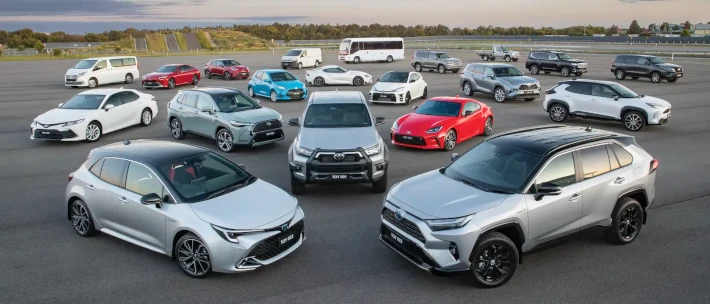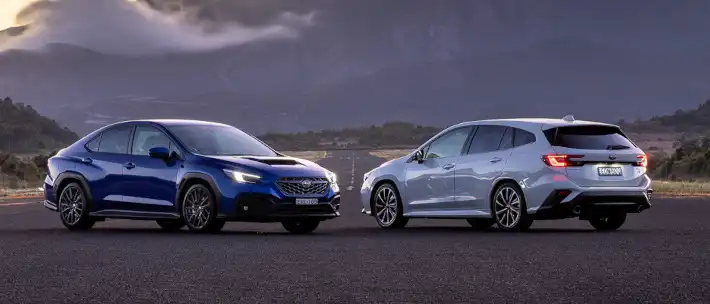This year, we're set to see a number of new commercial and people-mover vans hitting Australian shores powered entirely by electricity.
Whether you're looking for a smooth, silent family van or a super practical, work-ready cargo van, 2025 is set to be a big year for the segment.
With that in mind, let's take a closer look at some of the best EV vans coming to Australia in 2025, as well as a look at some that are already on sale.
Geely Farizon SuperVan

Geely is set to shake up the world of electric vans in 2025 with the launch of the Farizon SuperVan.
Geely's commercial-focused Farizon sub-brand is set to bring the SuperVan to Australia in three versions, including short and long-wheelbase flavours, as well as a long-wheelbase version with a high roof design.
The company is yet to confirm pricing for the SuperVan lineup, though we do know that they will come powered by an electric motor pushing out 170kW of power and 336Nm of torque, with juice supplied by an 83kWh LFP battery pack said to offer up to 376km of range on the WLTP test cycle.
Cargo capacities range from 6.95m3 in SWB versions while the largest LWB high roof variant is expected to carry up to 11.22m3 worth of cargo, with 2,000kg braked towing figures across the range.
Get in touch with one of our Car Buying Specialists today.
Request a quoteXPENG X9

China's XPENG is set to grow its presence in Australia with the launch of a large, premium family people-mover known as the X9.
The X9 comes underpinned by the company’s 800-volt architecture, promising ultra-fast 10 - 80 per cent charging times of just 12 minutes, with access to the right charger and range figures starting at 580km from a 94.8 kWh battery pack, increasing to 740km from the long range variant's 105 kWh battery pack.
The X9 rides on a clever dual-chamber air suspension system and treats those inside the cabin to acres of space, with a luxurious seven-seat layout featuring a pair of captain's chairs in the second row, with the option of zero-gravity seats.
Prices for the XPENG X9 are expected to kick off from $77,200 for the base version and stretch out to $90,000 for the range-topping version.
Ford E-Transit Custom

While the Ford E-Transit has been available in Australia since 2023, the company is readying the smaller E-Transit Custom for launch in the third quarter of this year.
Prices will kick off from $77,590, with buyers picking up the option of a short-wheelbase Sport variant and a long-wheelbase Trend version, both of which come powered by a 64kWh battery pack offering up to 301km WLTP-certified range and an electric motor pushing out 160kW / 415Nm.
Ford says the 64kWh battery pack can be charged at speeds up to 125kW, translating to a 15 - 80 per cent charge in around 30 minutes, with cargo capacities totalling 5.2m3 - 6.0m3 for the short and long-wheelbase versions, respectively.
Zeekr 009

The Zeekr 009 is a massive, luxurious electric people mover set to make a grand entrance to Australia's family van segment in 2025.
Zeekr's 009 comes powered by a dual electric motor setup producing a monstrous 450kW of power and 693Nm of torque, with the massive 116kWh battery pack offering up to 582km of range on the WLTP test cycle.
Inside, the 009's cabin is offered in both six- and seven-seat versions, with massaging, Nappa leather seats, a glass roof, a 17-inch display in the rear of the cabin and a massive 35.95-inch augmented reality head-up display headlining the lengthy features list.
Prices for the Zeekr 009 range kick off from $135,900 for the seven-seat version, while the 009 six-seater is priced at $139,900.
Volkswagen ID. Buzz Cargo

The Volkswagen ID. Buzz Cargo touched down in the late stages of 2024, hoping to carve out a slice of the EV cargo van segment here in Australia this year.
The ID. Buzz Cargo is offered in a short wheelbase format that comes powered by a meaty electric motor pushing out 210kW of power and 550Nm of torque, offering 1,200kg worth of towing capacity and range figures of 431km from the 79kWh battery pack.
It's a more refined take on the traditional workhorse platform that offers cargo capacities of 3.9m3 and particularly good manners on the road, even when loaded up to its 672kg payload capacity.
Mercedes-Benz EQV

Mercedes has given its luxurious people mover, the EQV, a facelift for the MY25 model year, asserting itself as one of the most premium options in the segment.
The EQV comes powered by an electric motor producing 150kW of power and 365Nm of torque, with 418km of range on offer from its 90kWh battery pack that can be DC fast-charged at speeds up to 110kW.
Inside, the EQV receives leather upholstery, power-sliding doors, heated seats and a massive 1,030L worth of boot space with all the seats standing, expanding to 4,630L with the seats folded.
Mercedes-Benz eSprinter

Mercedes-Benz is no stranger to the commercial van segment, with the company launching its battery-electric eSprinter here in Australia for 2025.
The company offers the eSprinter in both medium and long-wheelbase formats, the former picking up an 81kWh battery pack good for up to 241km of range while the LWB version picks up a larger 113kWh battery pack that raises range figures up to 331km.
Both versions come powered by an electric motor pushing out 150kW of power and 400Nm of torque to the rear wheels, with cargo capacities ranging from 9m3 in the MWB version up to a massive 14m3 in the eSprinter LWB.
Peugeot E-Expert

Peugeot's E-Expert range has given the Expert range a makeover and a brand-new electric powertrain to bolster its appeal in the commercial EV van segment.
The E-Expert is powered by an electric motor pushing out 100kW of power and 270Nm of torque, with juice supplied by a 75kWh battery pack that offers up to 330km of range on the WLTP test cycle.
With the help of a 100kW fast charger, fleet operators and small business owners can charge the E-Expert's battery pack up to 80 per cent in a claimed 45 minutes, with 1001kg worth of payload and cargo capacities totalling 6.1m3.
LDV eDeliver 9

LDV made waves with the introduction of the eDeliver9 - a large, practical cargo van package powered entirely by electricity that has been lapped up by fleet buyers looking to cut down on their emissions.
The eDeliver9 is offered in cab chassis and medium wheelbase versions with the option of a high-roof variant that lifts cargo capacities from 10.9m3 up to 12.3, with impressive payload figures between 1,350 - 1,410kg on offer.
LDV's eDeliver9 range comes powered by an e-motor pushing out 150kW of power and 310Nm of torque, with up to 280km of range on offer from its 88.5kWh battery pack.
LDV also offers the eDeliver7, a smaller cargo van in three different flavours that can drive up to 362km from an 88kWh battery pack and carry between 5.9 - 8.7m3 worth of cargo in the back.
FAQ: What is an EV Van?
As the name might suggest, an EV van is a van powered entirely by electricity. This can be either a passenger or a commercial van platform that utilises a rechargeable battery that provides power for one or more electric motors rather than a conventional petrol or diesel combustion engine. These vans fall under the category of battery-electric vehicles (BEVs) and are becoming increasingly more popular for commercial buyers and fleet operators looking to cut down on their emissions.
FAQ: What are the Benefits of Having an EV Van?
Some of the biggest benefits of having an electric van centre on the reduced running costs they offer, over a comparable petrol or diesel van. Depending on where and when you charge the vehicle, the cost of topping up the battery is often far less than filling up a tank of diesel, while EV vans produce zero tailpipe emissions, which is increasingly more important for commercial buyers. Maintenance costs of EV vans can also prove notably less than their internal combustion-powered siblings.
FAQ: What is the Best Electric Van in 2025?
Some of the best electric vans in Australia in 2025 include the Ford E-Transit Custom, Volkswagen ID. Buzz Cargo, Zeekr 009, Peugeot E-Expert and E-Partner, the XPENG X9, LDV Mifa 9, Mercedes-Benz eSprinter and EQV, LDV eDeliver 7 and eDeliver 9 and the Renault Kangoo.
FAQ: What is the Best Van to Buy in Australia?
The best van for you to buy in Australia depends on whether you're a commercial or a family buyer. For businesses, some of the best EV vans include options like the Ford E-Transit lineup, the Mercedes-Benz eSprinter, LDV eDeliver 7 & eDeliver 9 and the Peugeot E-Expert. For families, some of the best EV van options include the Mercedes-Benz EQV, LDV Mifa 9, the Zeekr 009 and the XPENG X9.
Request a Quote
If you're looking to get the best deal possible on your next car, reach out to one of our car-buying experts.
Get in touch with one of our Car Buying Specialists today.
Request a quote








